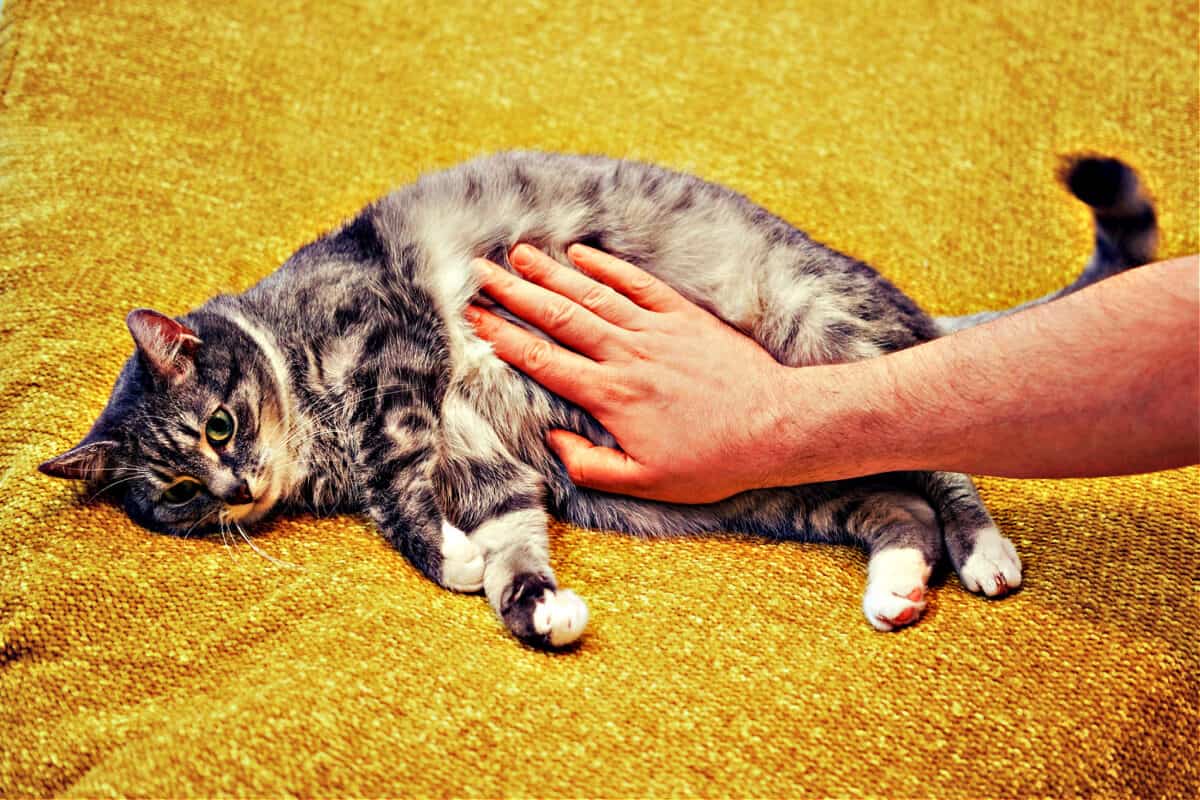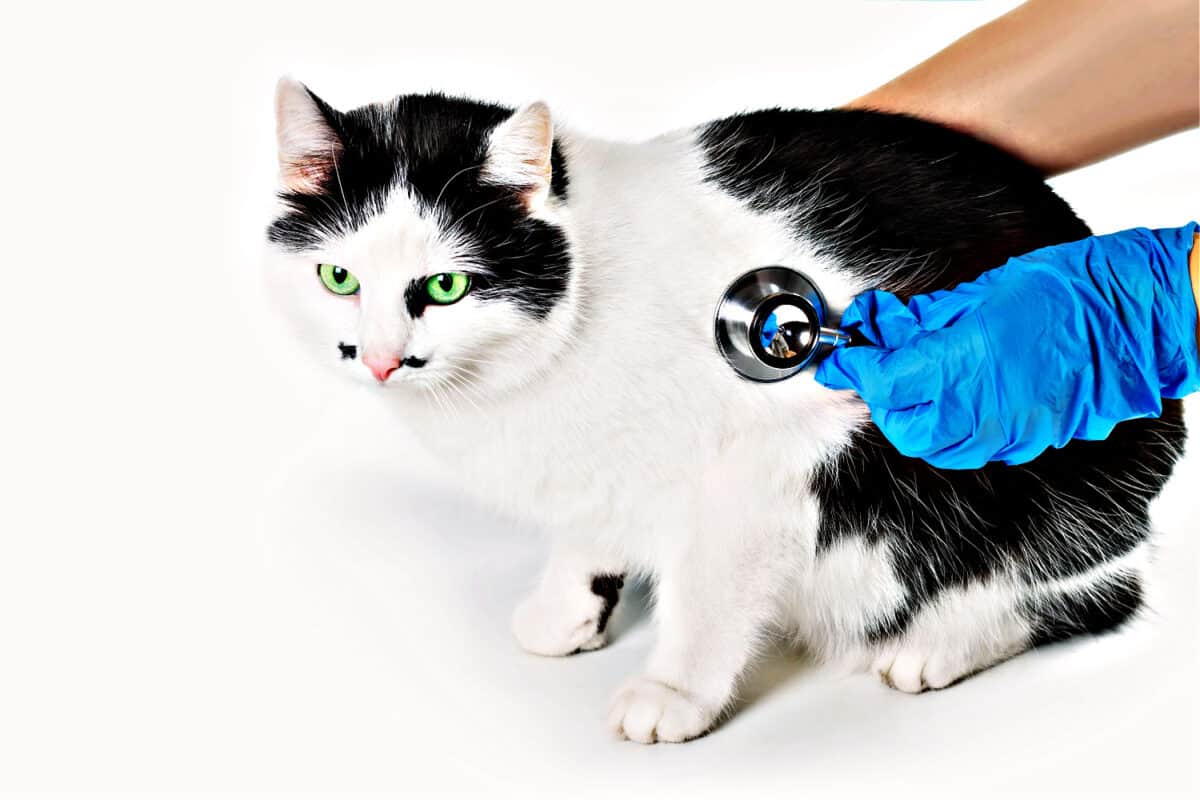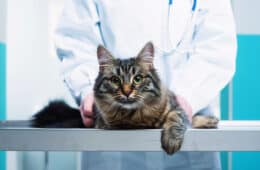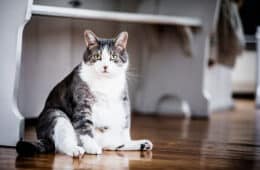Inflammatory Bowel Disease (IBD) in cats can be a real struggle for both your feline friend and you as a pet owner.
In this article, we'll break down what feline IBD is, why it causes significant discomfort, and how it differentiates from similar conditions.
We'll also guide you through the various symptoms of IBD, helping you identify if your cat may be affected.
Moreover, we will touch on the strategies for managing this chronic condition and improving your cat's quality of life.
Our aim is to equip you with knowledge, empathy, and practical tips, making this difficult journey a bit easier for you and your cat.

Understanding Inflammatory Bowel Disease (IBD) in Cats
"Please help my IBD Kitty!" the call often comes up in our Cat Health forum.
For example, in this post, TCS member bentley2013 writes, "I'm so discouraged. Bentley eats small amounts but almost exactly 4 hours later he loses it all out his bottom. He just threw up too... I really am a mess..."
So what is this disease and why do these cats suffer from so many gastrointestinal symptoms?
What is Inflammatory Bowel Disease
Many people are familiar with a condition called IBS, or Irritable Bowel Syndrome, and think feline IBD may be similar. It's not.
IBS is a psychosomatic condition (albeit with very real physical symptoms). However, IBD in cats refers to a group of chronic inflammatory conditions that severely impact the cat's gastrointestinal tract.
In all forms of IBD, there is a problem with inflammatory cells from the immune system. These cells are collecting and infiltrating the walls of the cat's intestines.
What should have been a moderate immune reaction turns into an out-of-control thickening of the inner lining of the small intestinal tract. As a result, the microscopic shape of the lining changes in ways that diminish the cat's ability to digest food.
The different forms of IBD reflect different types of inflammatory cells which are at the root of the problem.
There are three types of IBD disorders, the most common is called lymphocytic-plasmacytic enteritis. In this type of IBD, inflammation is caused by white blood cells called lymphocytes.
The other two types of IBD are called Eosinophilic IBD and Neutrophilic IBD. Their names refer to the respective kind of white blood cells causing the issue.
SIGN UP FOR THECATSITE'S EMAIL UPDATES >
IBD Symptoms in Cats
IBD causes typical GI (gastrointestinal) tract symptoms. They indicate that the cat's bowels aren't working properly and food isn't digested the way it should be.
Symptoms can include diarrhea, constipation, painful defecation, vomiting, appetite loss, and weight loss. IBD is a chronic condition.
Many cats experience a symptomatic episode, followed by an asymptomatic period.
TCS member arinlars shared how her cat's IBD symptoms started:
"She started overtime having diarrhea some months now but not every day along with vomiting. The last couple of months she had diarrhea every day and vomiting 3-4 times a week. But, she eats/drinks normally and she plays a lot."
GI tract symptoms are relatively general and can indicate a plethora of medical conditions.
Viral infections, parasites such as Giardia or worms, and food allergies can all cause similar symptoms. Your vet will have to rule out these issues before diagnosing IBD.
While the vet may stick to treating the symptoms at first, a more aggressive diagnostic approach may be needed. This is especially important if the cat begins the downward spiral of weight loss.
A tissue sample taken through a gut biopsy can help confirm a diagnosis of IBD. Note that steroid treatment begun prior to biopsy could prevent a proper diagnosis.

Treating Inflammatory Bowel Disease (IBD) in Cats
Unfortunately, no one really knows what causes IBD in cats and at this point in time, there is no cure.
Once there's a definitive diagnosis of IBD, your vet will work on designing a treatment plan. The plan is intended at minimizing the number of active IBD episodes and their intensity.
During an active episode, your vet may prescribe steroids, antibiotics, and possibly probiotics or prebiotics as well. Drugs for dealing with symptoms such as nausea may be prescribed as well.
Treatment may also include a specialized diet intended to reduce the load of potential allergens and nutritional stressors.
Many owners report that switching to a raw diet helped their IBD cats. However, note that the risk of introducing a higher load of pathogens to the cat's body during this time may be too high.
If you opt for trying a raw diet, consider commercial raw food that has been treated with high-pressure pasteurization.
Also, if you consider any type of homemade diet, please take a minute to read our article: Feeding Raw to Cats - Safety Concerns.
Additionally, post any questions or thoughts you may have on our Raw & Homemade Diets forum.
At this point, there is no documented high-quality evidence (i.e. controlled studies in peer-reviewed journals) to indicate that a raw diet heals or prevents IBD in cats. Also, it may be contraindicated for some cats, aggravating their condition.
You may also want to consider consulting with a veterinarian nutritionist. You can find such a specialist via the American College of Veterinary Nutrition (http://www.acvn.org/) or The European College of Veterinarian Comparative Nutrition (http://www.esvcn.eu/).
A Quick Recap on IBD in Cats
Inflammatory Bowel Disease (IBD) in cats is a chronic inflammatory condition, distinct from Irritable Bowel Syndrome, causing gastrointestinal symptoms like diarrhea, vomiting, and weight loss.
Diagnosis involves a gut biopsy and the exclusion of other potential causes. While no cure exists for IBD, treatments like medication and dietary changes can manage symptoms and improve a cat's quality of life.
Support through vet nutritionists and online communities can further ease the journey. Despite the challenges, with understanding and care, cats with IBD can still lead comfortable and joyful lives.
SIGN UP FOR THECATSITE'S EMAIL UPDATES >
Comments? Leave them using the form below. Questions? Please use the cat forums for those!
Note: We may get commissions for purchases made through links on this page.



.jpg)
9 comments on “Inflammatory Bowel Disease (IBD) In Cats [A Guide]”